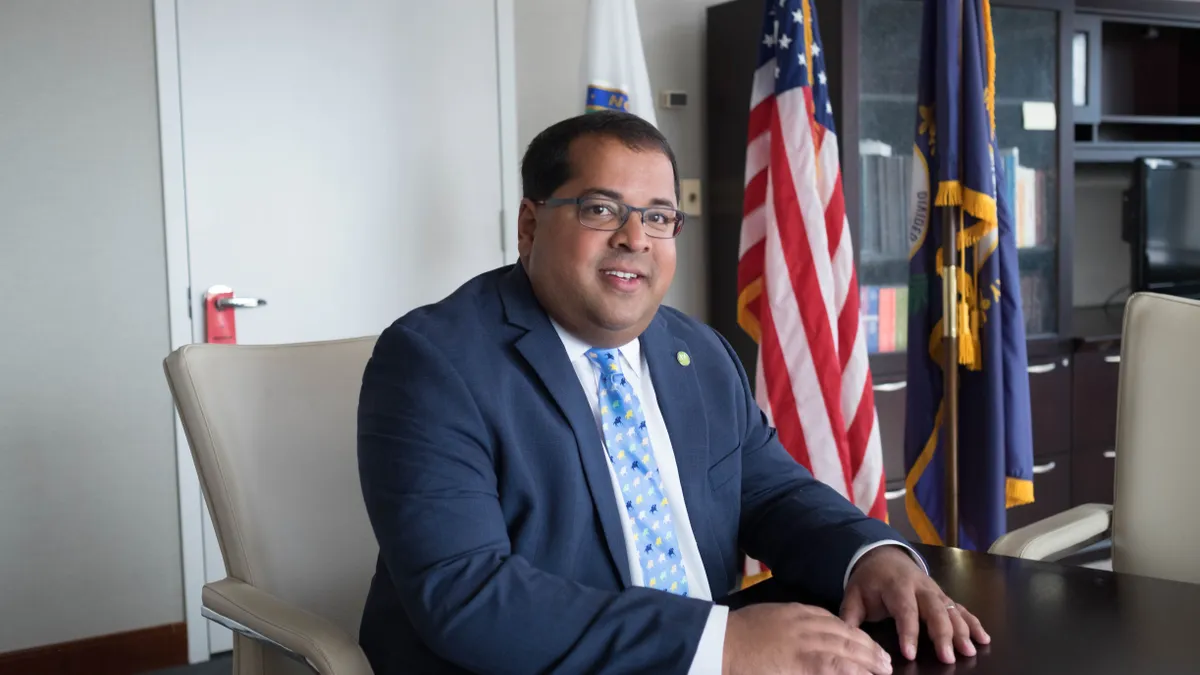It's hard to imagine any regulatory body that has had more influence on the U.S. power sector this year than the Federal Energy Regulatory Commission, and it's impossible to divorce that impact from its now-former chairman: Neil Chatterjee.
This year marked Chatterjee's second full year as chairman of FERC and his third on the commission. Last year ended with the commission passing one of its most consequential — and controversial — policies under President Donald Trump: expanding the Minimum Offer Price Rule within the PJM Interconnection, an issue that carried well into 2020.
States decried the commission and its leadership, calling the move an attack on states' rights. The renewable energy industry was displeased as well, and even PJM said the order went too far while at least one generator that had backed FERC's proposal said it would be willing to come to the table and negotiate a long-term solution.
Controversy continued throughout 2020 as the commission overhauled regulations under the Public Utility Regulatory Policies Act, and rejected the New York Independent System Operator's buyer-side mitigation (BSM) measures for its capacity market, as well as the ISO's proposal to alter its capacity market to accommodate an anticipated onslaught of new renewable energy resources. And opposition was not just rhetorical — several entities filed lawsuits against FERC's PJM MOPR decision.
But FERC also pursued a number of well-received policies. The U.S. Court of Appeals for the D.C. Circuit in July upheld a commission order lowering barriers to energy storage in wholesale markets. That ruling ultimately paved the way for the commission's Order 2222, an effort to lower wholesale market barriers for distributed energy resources, passed in September. Order 2222 has been described by former FERC Chair Jon Wellinghoff as "the most significant order the Commission has ever issued," and has seen little pushback outside a few small clarification requests.
The commission also held a first-ever technical conference on carbon pricing and ultimately issued a carbon pricing policy statement affirming FERC's ability to approve a grid operator's proposal. Ironically, it was carbon pricing — an issue with broad public stakeholder support that Chatterjee and others say likely cost him his chairmanship in November, just days after the presidential election.
If carbon pricing was behind Chatterjee's early dismissal as chair, he said "it would have been totally worth it."
"I knew when I moved forward with Order 2222, convening the tech conference on carbon pricing, and ultimately moved forward with a proposed policy statement, that there was the risk of blowback. I knew that, [but] went forward anyway, because I thought it was the right thing to do," he said in an interview.
Neil Chatterjee's legacy
Renewable energy interests are broadly mixed on their opinions of Chatterjee's legacy as chair. The industry appreciates the commission's efforts around DERs, carbon pricing, and storage, as well as FERC's ultimate rejection of a proposal to upend net metering nationwide, filed by the New England Ratepayers Association (NERA), calling such steps "positive" and "welcome."
But they say that progress cannot be divorced from the more "destructive" policies passed under his reign.
"[M]easures like the PJM MOPR and NYISO BSM have been deeply disappointing and destructive. Those misguided policies impermissibly undermine the ability of low-cost renewables to compete fairly in the marketplace," Gregory Wetstone, president and CEO of the American Council on Renewable Energy, said in an email.
Competitive power suppliers defend his record, saying he managed to balance addressing emerging technologies "while strongly and clearly protecting the wholesale power markets," Todd Snitchler, president and CEO of the Electric Power Supply Association, said in an email.
"The forward-thinking approach demonstrated by the carbon pricing technical conference and open-minded approach to emerging issues combined with a clear defense of competition is the kind of thinking the industry needs in a time of accelerating change," he added.
Chatterjee himself said many of these policies were ultimately "tough decisions," but he hopes the sum of those decisions will both preserve market competition and accelerate decarbonization.
He further wants stakeholders to someday "step back and see this all made sense. These things all dovetail and ... the common throughput through all of them [is] the markets."
"Ultimately, if states taking action on carbon pricing can be accommodated in our markets, then I think we will have done our jobs and done our jobs well," he said. "And I think some of the people who have expressed concerns about some of the actions that we've taken, hopefully, with the benefit of time and reflection, will see that that it all worked."



 Read more
Read more









